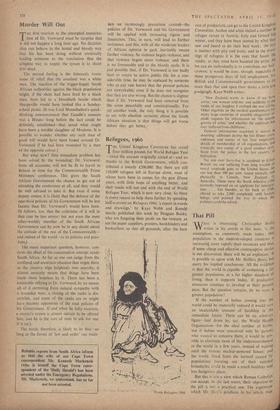Murder Will Out
rr RE first reaction to the attempted assassina- tion of Dr. Verwoerd must be surprise that it did not happen a long time ago. No dictator- ship can behave in the brutal and bloody way that his has been doing without eventually leading someone to the conclusion that the simplest way, to topple the tyrant is to shoot him dead.
The second feeling is the hideously ironic sense of relief that the assailant was a white man. The reaction of the trigger-happy South African authorities against the black population might, if the shots had been fired by a black man, have led to a bloodbath beside which Sharpeville would have looked like a Sunday- school picnic. (It was Lord Mountbatten's quick- thinking announcement that Gandhi's assassin was a Hindu—long before the fact could be definitely, established—that saved what might have been a terrible slaughter of Moslems. It is possible to wonder whether any such man of good will would have been fou.nd around Dr. Vetwoerd if he had been wounded by a man of the opposite colour.) But what now? One immediate problem has been solved by the wounding; Dr. Verwoerd, from all accounts, will not be fit to travel to Britain in time for the Commonwealth Prime Ministers' conference. This gives the South African Government the chance to get out of attending the conference at all, and they would be well advised to take it. But even if some deputy comes, it is likely that the defence of the apartheid policies of his Government will be less fanatic than Dr. Verwoerd's would have been. (It follows, too, that the criticisms of it will in that case be less severe; but not even the most other-worldly member of the South African Government can by now be in any doubt about the attitude of the rest of the Commonwealth— and indeed of the world—to its policies and prac- tices.) The more important question, however, con- cerns the effect of the assassination attempt inside South Africa. As far as one can judge from the confused and uncertain situation that reigns there as the country slips helplessly into anarchy, it almost certainly means that things have been made more hopeless by it. There has been a noticeable rallying to Dr. Verwoerd, by no means all of it stemming from natural sympathy with a wounded man; a closing of the ranks is dis- cernible, and some of the ranks are or might have become opponents of the mad policies of his Government. If and when he fully recovers, a martyr's crown is almost certain to be offered him, and he is the sort of man to ask for one if it isn't.
The result, therefore, is likely to be that ---so long as the forces of 'law and order' can main- tam n an increasingly precarious control—the policies of Dr. Verwoerd and his Government will be applied with increasing rigour and fanaticism. This, in turn, will lead to further resistance, and this, with all the moderate leaders of African opinion in gaol, inevitably means further violence. So violence begets violence, and that violence begets more violence, and there is no foreseeable end to the bloody cycle. It is just possible that, if Dr. Verwoerd is too badly hurt to return to active public life for a con- siderable time, he may be replaced by someone who at any rate knows that the present policies are unworkable, even if he does not recognise that the' are also wrong. But the chance is slighter than if Dr. Verwoerd had been removed from the scene peacefully and constitutionally. For yet another week, the only thing it is possible to say with absolute certainty about the South African situation is that things will get worse before they get better,-


































 Previous page
Previous page